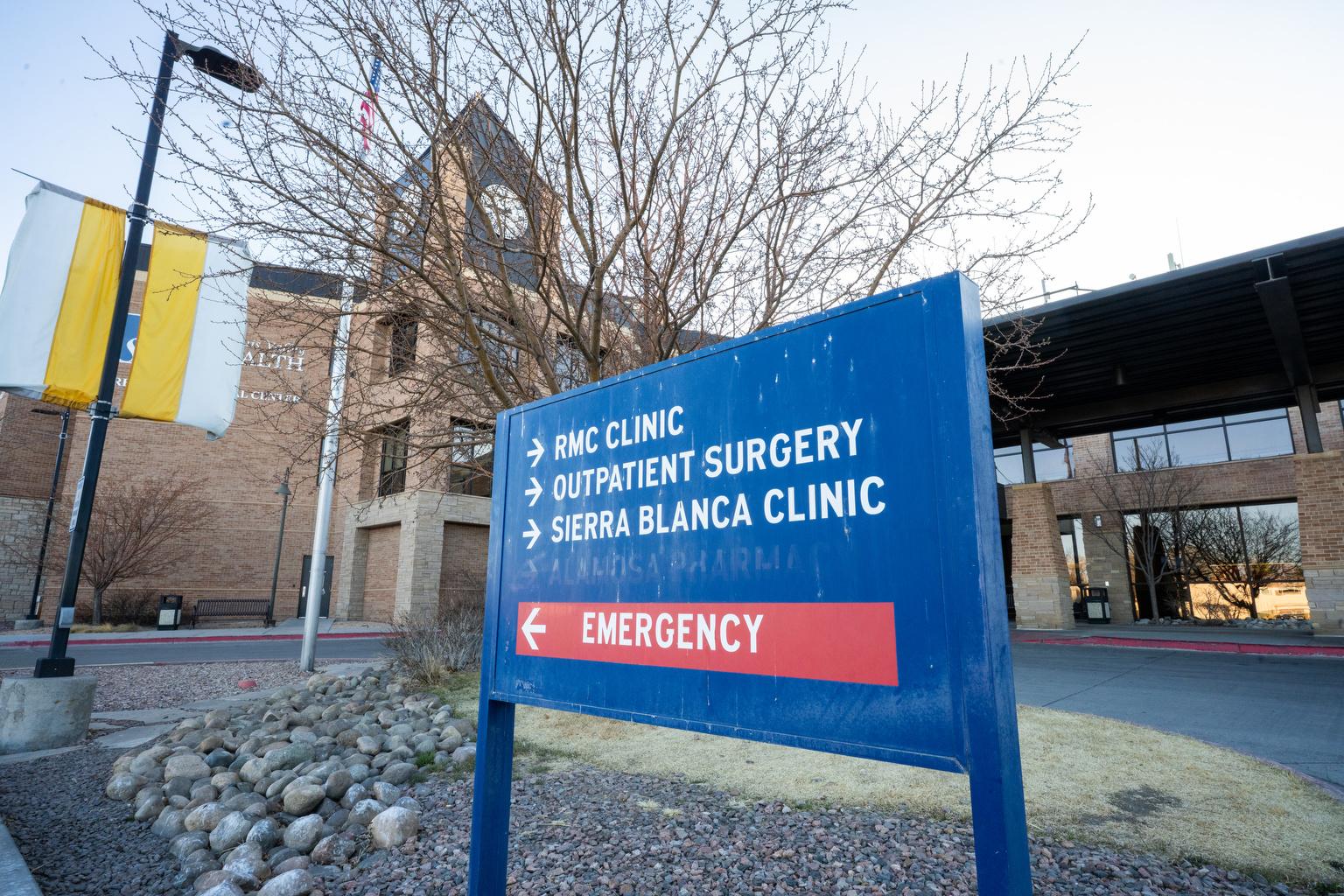
The budget bill making its way through the Republican-led Congress would cause as many as 200,000 Coloradans to lose Medicaid health coverage, representing a historic retreat from health care coverage that had expanded under recent Democratic presidents.
That's according to KFF, an independent health policy group, which released a state-level analysis of federal Medicaid cuts Friday.
The plan, as it stands on Friday afternoon, would reduce federal spending on Medicaid by $625 billion. Republicans, like Colorado Congressman Gabe Evans, who sits on a key House committee, say they’re looking to save money by identifying and stopping waste, fraud and abuse. Democrats have countered that cuts can’t be made without stripping people’s health coverage.
It would slash about a billion dollars over a decade for Colorado, KFF reported.
“The changes to Medicaid and the Affordable Care Act would save the federal government a substantial amount of money and represent the biggest rollback in federal support for healthcare ever,” said Larry Levitt, KFF’s executive vice president for health policy.
The impacts would be broad and force vexing decisions on state leaders. “Whether it's revenues available to states and the tough choices they have to make about taxes and support for other programs, hospital revenues, physician revenues, and of course coverage for people on the ground,” Levitt told reporters on a call.
The future for the reconciliation bill in the U.S. House of Representatives, which Republicans control, but by a slim margin, is up in the air. On Friday, GOP hardliners, who want deep cuts to Medicaid and federal clean energy programs, voted to block the measure in a critical committee.
The joint federal/state program helps cover medical costs for some people with limited income and resources. In Colorado, the program covers people in every part of the state from small rural towns to big suburbs and cities; at least 100,000 people are enrolled in the program in each of the state’s eight Congressional districts.
Most Americans have a connection to the program, which is broadly popular, across the political spectrum, according to KFF polling.
Number of Coloradans losing Medicaid coverage would be as many as 207,000
KFF estimated the loss of Medicaid enrollment state by state, based on the reconciliation bill from the House Energy and Commerce Committee, which is playing a key role in the budget process. Rep. Evans is a member of the committee, which voted to advance the bill on a party-line vote.
The group found on the high end as many as 207,000 Coloradans could lose coverage, with a low estimate of 124,000 and a mid-point estimate of 165,000.
The analysis depends on the latest data available from various data sources, including 2024 Medicaid spending and enrollment data, U.S. Census Bureau resident population data, and preliminary estimates from the Congressional Budget Office.
The Congressional Budget Office estimates the bill would decrease Medicaid enrollment nationally by more than 10 million people in 2034, “suggesting that most of CBO’s estimated savings stem from reduced enrollment,” the report noted.
The three biggest sources of federal Medicaid savings in the budget package account for nearly 90 percent of the total savings, the group reported. That includes:
- mandating adults who are eligible for Medicaid through the Affordable Care Act expansion, which passed under President Obama, meet work and reporting requirements ($300.8 billion)
- Repealing a Biden Administration rule simplifying Medicaid eligibility and renewal processes ($162.7 billion)
- Establishing a moratorium on new or increased provider taxes ($86.8 billion)
The bill would ban states from establishing any new provider taxes — or increasing existing ones — to draw down extra Medicaid dollars. Colorado’s version of the tax is known as the Hospital Provider Fee.
Those provider taxes paid by hospitals help cover the state’s Medicaid costs by increasing the federal government’s matching payments; some of that extra money ultimately goes back to the hospitals.
If the bill passed, it would rattle the foundations of Colorado’s health care system, because Medicaid funding is such a key element, for hospitals, community health centers and clinics and, ultimately, patients.
“Reductions in Medicaid could have significant implications,” said Robin Rudowitz, vice president and director of KFF’s Program on Medicaid and the Uninsured.
Rural hospitals, as well as urban ones, could face program cutbacks or even closure, if deep Medicaid cuts are passed. Patients, who receive benefits because of things like a disability, could potentially lose coverage as well.
Colorado expanded who is eligible for Medicaid coverage with the launch of the Affordable Care Act, a key policy priority of the Obama administration in 2014. It covered many Coloradans who had been uninsured, marking a historic change. It provided more Coloradans than ever before with health insurance. The state’s uninsured rate was cut sharply from about nearly 16 percent in 2011 to below 5 percent in 2023, according to the Colorado Health Institute.
Medicaid cuts would force tough tradeoffs
Colorado could face nearly a billion dollars in Medicaid cuts, $999 million to be exact, under the budget bill, according to the KFF analysis.
State officials have said Colorado, which is already strapped for funds, wouldn’t have the money to replace that funding.
“These are all hard decisions at the state level, particularly if they need to pass balanced budgets each year to accommodate this level of reductions,” said Rudowitz.
To cover the lost federal funds, the state would have to reduce its spending on the program. Colorado’s state Medicaid funding per resident would drop sharply, by 20 percent, KRR found.
State leaders could try to replace the money by raising taxes — but would have to increase taxes by 5 percent per resident. Or, it could cut spending on another important category that’s a big share of the state budget — education.
To make up for the lost Medicaid funding, Colorado would have to decrease state education funding by 16 percent.
The report lays out the consequences in stark language.
“Cuts of $625 billion will force states to make tough choices: maintain current spending on Medicaid by raising taxes or reducing spending on other programs; or cut Medicaid spending by covering fewer people, offering fewer benefits, or paying providers less,” its authors wrote.
The debate over work requirements
Key officials in the Trump administration made their case for work requirements, the requirement that Medicaid enrollees work in order to receive government benefits, in an op-ed in Wednesday’s New York Times.
“The increased share of welfare spending dedicated to able-bodied working-age adults distracts from what should be the focus of these programs: the truly needy,” wrote Robert F. Kennedy Jr., Mehmet Oz, Brooke Rollins and Scott Turner. Kennedy is the secretary of Health and Human Services. Oz is the administrator of the Centers for Medicare & Medicaid Services. Rollins is the secretary of Agriculture. Turner is the secretary of Housing and Urban Development.
“This should not be the American way of welfare,” they wrote. “That’s why we are joining efforts to require able-bodied adults (defined as adults who have not been certified as physically or mentally unfit to work), with some exceptions, to get jobs and calling on Congress to enact common-sense reforms into law.”
In the call with reporters, KFF’s policy analysts said most people in the Medicaid expansion population, who stand to potentially lose coverage due to the cuts, either already work or satisfy criteria for an exemption.
“The data that is available suggests that most people on Medicaid and most people in the expansion group are either working or importantly, they are not working for reasons that should qualify them for an exemption,” said Jennifer Tolbert, deputy director of KFF's Program on Medicaid and the Uninsured, and an expert on Medicaid eligibility, enrollment, access, and affordability of coverage.
Reasons for an exemption include that the person has a disability, or because they’re caregiving for young children or other family members or are in school, she said.









